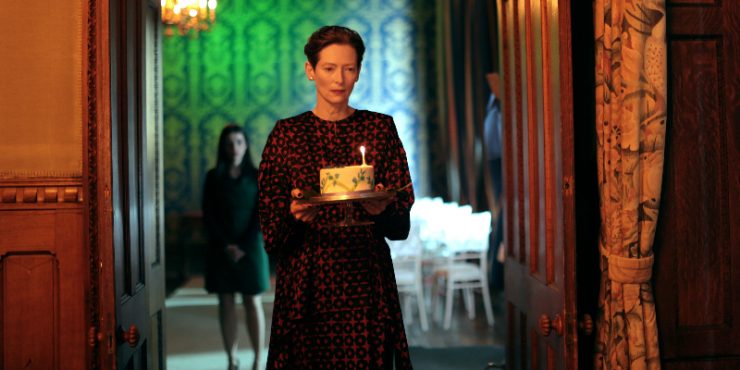David Foster Wallace once famously claimed that “every love story is a ghost story”. Like many of Wallace’s quotes, it’s a romantic gesture flush with alternate meanings. I don’t think of Joanna Hogg as a David Foster Wallace acolyte, but I’ve never seen a film that captures the certainty of that quote quite like The Eternal Daughter. Like a lot of Hogg’s work, Eternal Daughter is a tiny little film, this one talking place in a spooky hotel deep within the Welsh forests, replete with moody fog and a nearby cemetery. The rooms are empty and the noises at night are enough to keep even the deepest sleeper awake. It’s the perfect setting for the kind of unsettling horror stories made famous by Shirley Jackson or Edgar Allan Poe. Once you step in, you’re sucked into a world both haunting and literary, discomfited by its undying poetry.
The film stars Tilda Swinton in not one but two roles, a double dose of one of our greatest living actors and one of Hogg’s most frequent collaborators. Swinton plays Julie Hart and her mother, Rosalind. Those familiar with Hogg will know that these are the same names as the protagonist and her mother in the two Souvenir films (in those, Swinton only plays the mother, Rosalind). Knowing that Julie has before been played by Tilda’s actual daughter, Honor Swinton Byrne, might be enough to give you a meta-induced migraine, but Eternal Daughter does enough to separate itself from the other films, both in tone and content, to be more of a kind of spin-off than an official sequel. Where The Souvenir Parts I and II are impressionistic coming-of-age docudrama, The Eternal Daughter is a gothic tale about a mother-daughter relationship, an attempt to find closure from beyond the grave.
The hotel is one that Rosalind had visited when she was a young girl. Now that Rosalind is a widow, Julie decides to accompany her on a trip down memory lane. The main goal is to give her mother a nice holiday and to cheer her up, but Julie is also researching a new screenplay, one she hopes to be about Rosalind and their relationship. At opportune moments, Julie secretly records conversations between them, collecting details from the past that will become content for her next film. The project is off to a shaky start. The aforementioned noises keep Julie up at night (Rosalind takes a trusty sleeping pill), and the only staff in the building – really the only other people in the building – are a kind and helpful groundsman (a wonderfully warm Joseph Mydell) and a young, dismissive desk clerk (a hilarious Carly-Sophia Davies).
As their stay proceeds, it becomes clear that a lot of Rosalind’s memories from the hotel are not as happy as previously believed. She speaks of discoveries of dead relatives and relationship squabbles, much to the horror of Julie who fears she’s re-traumatized the same mother she meant to comfort. Ever the mother, Rosalind makes pains to console Julie by saying that everything is fine, stressing that all memories, good and bad, have their use. Julie cannot understand. This is the rub: how can one fully understand their parents? Another 2022 film, Aftersun, also covers the theme of the unknown parent. Both that and Eternal Daughter are seeped in mystery, tracking the actions and melancholies of a parent like clues to a riddle too impossible to solve. Where Aftersun uses the directness of a digital video camcorder to reconstruct memories, Eternal Daughter uses phantasmagoria to create a different reality.
There is more to The Eternal Daughter than it may initially appear. A shift near the end is perhaps very easy to predict, but it does not feel like a cheap plot twist. Hogg is always quick to remind the audience of the fantasy behind the autobiographical details. A grave soundtrack booms throughout to emphasize the spectral presences that surround them, and a short ghost story by Kipling is even shown briefly as Julie reads. There is the practical matter that Rosalind hardly looks older than she does in The Souvenir despite the seemingly decades-long time jump, a detail that only enhances the film’s supernatural themes and plays into Hogg’s evocation of the woman she’s trying to so hard to understand.
Swinton, one of the few actors who has truly earned their reputation for originality and skill, is astonishing here. Despite the playing of two parts, the performance is strikingly downplayed, rarely striving for grand gestures. There isn’t a lot of obvious effort made to differentiate the two performances, instead choosing to play each part as reflections of the other. As Julie’s frustrations come to the forefront – Why isn’t Rosalind hungry? Is she feeling unwell? Why can’t she ever ask for anything? – her projections on her mother become more and more apparent. Swinton’s singular talent is such that she can be chameleonic in films where she’s only playing one character, but The Eternal Daughter is amongst her very best, and one of the few emotionally centered performances she’s ever had.
The Eternal Daughter‘s dialogue with The Souvenir is undeniable, but this is a remarkable departure from her past work. It delves into genre in a way that only she could pull off, twisting the tropes of romantic horror into her auto-fictional web. The story brims with humor and charm, but it is also a descent into the deep, dark sadness of bereavement. There is the occasional phantom appearance, but the true ghosts of the story are the memories conjured in an effort to understand. Much like Rosamund’s memories of the hotel, Julie’s memories of her mother can bring pain when they’re meant to bring solace. In the suppression of unpleasant realities, The Eternal Daughter uncovers wondrous moments of grace and communion between Julie and Rosalind, a moving testament to the persistence of grief and how it can create its own kind of beauty.
Written and Directed by Joanna Hogg










